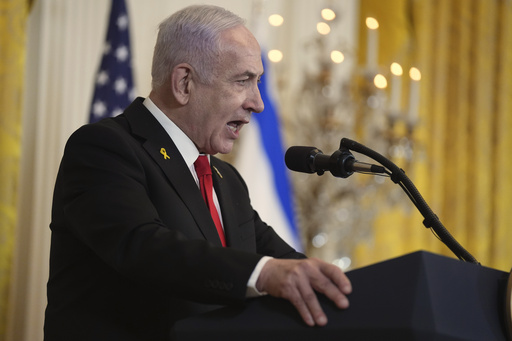
WASHNGTON — On Tuesday, former President Donald Trump proposed a controversial plan envisioning the permanent relocation of Palestinians in Gaza, suggesting that the U.S. could take “ownership” of the war-ravaged area and redevelop it into what he dubbed “the Riviera of the Middle East.”
Such remarks are likely to complicate ongoing negotiations aimed at extending the fragile ceasefire between Israel and Hamas, as well as securing the release of hostages still held in Gaza.
Trump made these provocative statements during a news conference alongside Israeli Prime Minister Benjamin Netanyahu, coinciding with an uptick in discussions centered around increased humanitarian assistance and reconstruction efforts for Gaza after more than 15 months of intense conflict. His proposal implies resettling around 1.8 million Palestinians to different locations, suggesting a potential involvement of U.S. troops in the process.
“The U.S. will take over the Gaza Strip, and we will do a job with it too,” Trump asserted during the evening conference, emphasizing that the redevelopment efforts would be high-quality and beneficial, particularly for Palestinians. These discussions took place at the White House, where the leaders exchanged thoughts on the precarious ceasefire and ongoing hostage negotiations, with Iran also being a point of concern.
The former president proposed redeveloping Gaza after resettling its current inhabitants, intending to create a desirable living environment for the “world’s people, including Palestinians,” although he did not specify the legal basis for such actions.
Egypt, Jordan, and various U.S. allies in the region have warned that relocating Gazans could destabilize the Middle East, escalate conflicts, and hinder years of diplomatic efforts aimed at establishing a two-state solution.
In a firm response, Saudi Arabia’s foreign ministry reiterated its unwavering support for an independent Palestinian state, highlighting their long-standing position in negotiations with the U.S. over recognizing Israel in exchange for security agreements and other terms. Saudi officials affirmed their commitment to alleviating the suffering of Palestinians, insisting they will not be uprooted from their land.
Despite the pushback, Trump maintained that the situation in Gaza was dire, stating that there was “no alternative” for Palestinians but to depart from what he called a “big pile of rubble.” Additionally, his aides expressed skepticism regarding a feasibility timeline of three to five years for rebuilding the war-torn area, as outlined in a temporary ceasefire agreement.
Leaders like Egyptian President Abdel Fattah el-Sissi and Jordanian King Abdullah II have dismissed Trump’s calls for resettlement. Nonetheless, Trump expressed confidence that Egypt and Jordan would eventually accept displaced Palestinians along with unspecified other nations.
Observing the ongoing death toll in Gaza over the years, Trump envisioned a better future for Palestinians, alleging that resettlers would enjoy lives free from violence.
Trump also hinted at the possibility of deploying U.S. troops to facilitate Gaza’s reconstruction, suggesting a long-term commitment to transforming the territory. His plan has drawn alarm from Democrats and raised concerns among some Republicans.
“I believe he’s completely lost it,” stated Sen. Chris Murphy, a Democrat, criticizing Trump’s notion of a U.S. invasion that could lead to significant casualties and further chaos in the region. Meanwhile, Sen. Lindsey Graham, a Republican, questioned the viability of Trump’s proposal but signified he was open to discussions.
The focus on Gaza’s future occurs amidst a tenuous truce between Israel and Hamas. Netanyahu faces contrasting pressures from right-wing coalition members advocating for a military response and from the public yearning to see hostages returned and the 15-month conflict concluded.
Trump seems to be banking on the idea that American financial assistance to Egypt and Jordan could persuade those nations to accept the influx of Palestinians. Some factions within Netanyahu’s government are notably supportive of relocating Gaza’s residents.
Trump’s Mideast envoy argued against the perception that Palestinians could return to Gaza in a few years, labeling it as unrealistic. The former president hinted at reevaluating the concept of a Palestinian state as part of a comprehensive solution to the enduring conflict.
Netanyahu’s visit to Washington for his first foreign engagement of Trump’s second term coincided with his declining public support amid ongoing corruption allegations. Being seen with Trump, who enjoys popularity in Israel, may boost Netanyahu’s standing during a challenging time.
While Trump commended Netanyahu’s leadership in progressing the hostage situation and ceasefire negotiations, the latter expressed his appreciation for Trump’s candid approach to problem-solving. However, Hamas condemned Trump’s statements, asserting they added fuel to regional tension.
As Israeli and U.S. officials prepare for further negotiations regarding the ceasefire’s future, Netanyahu announced plans for discussions and delegations to continue mediated talks with Hamas.
With mounting pressure from hard-right coalition members pushing for a renewed offensive against Hamas, Netanyahu’s government faces challenges as hostilities persist and negotiations unfold.
Hamas reestablished its authority in Gaza since the recent ceasefire, signaling conditions for the release of hostages contingent on an end to the war and troop withdrawals, while Netanyahu remains focused on achieving victory over Hamas and ensuring the safe return of hostages involved in the conflict.

